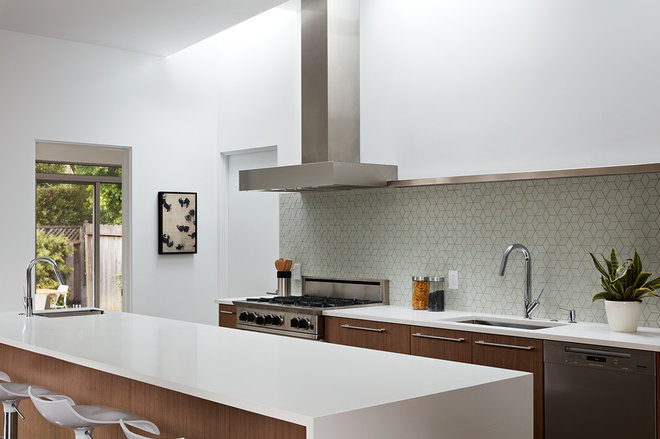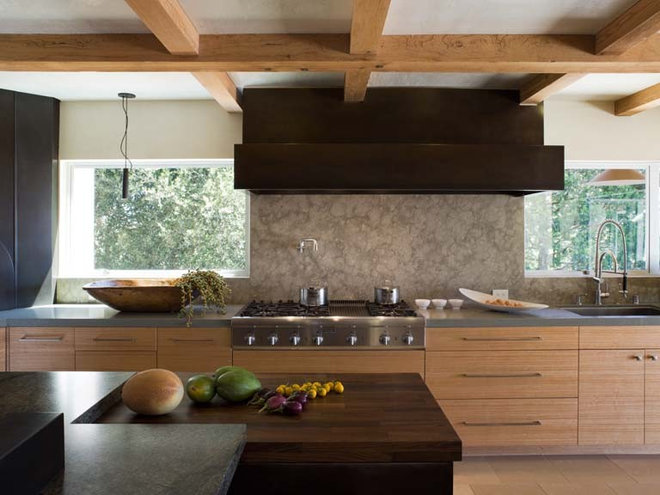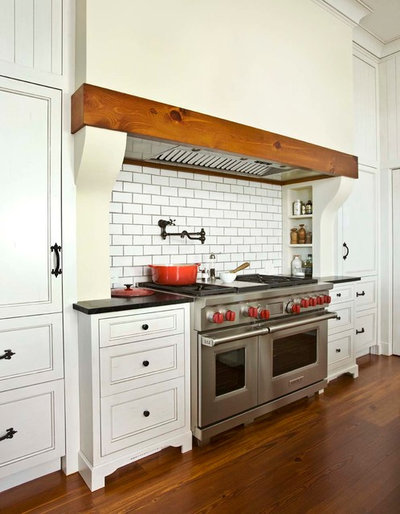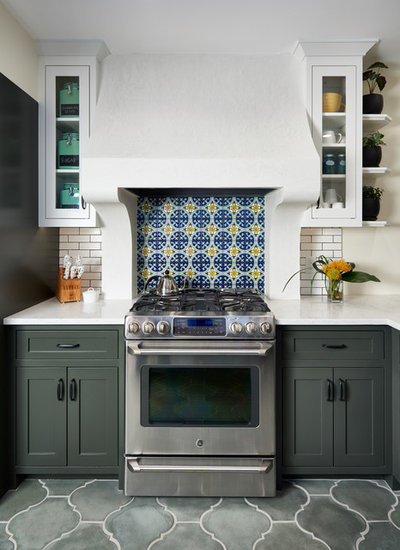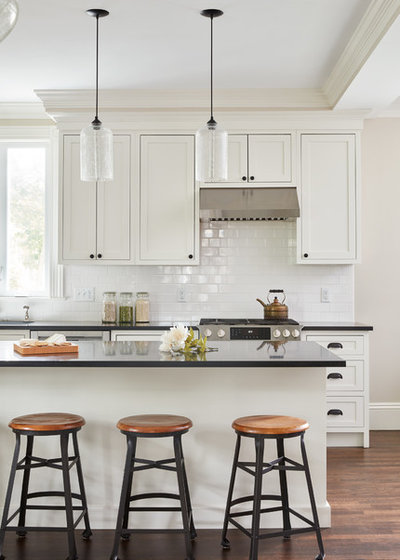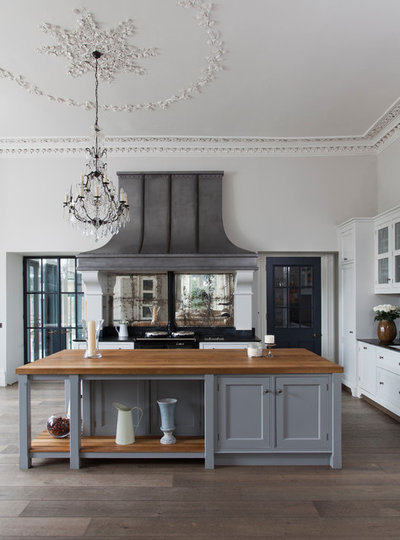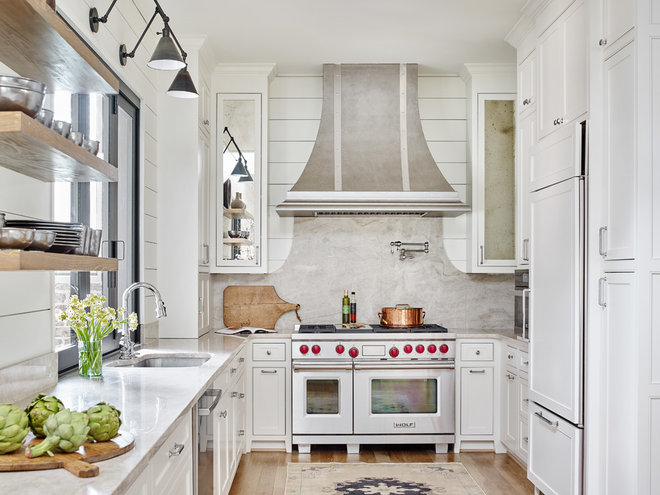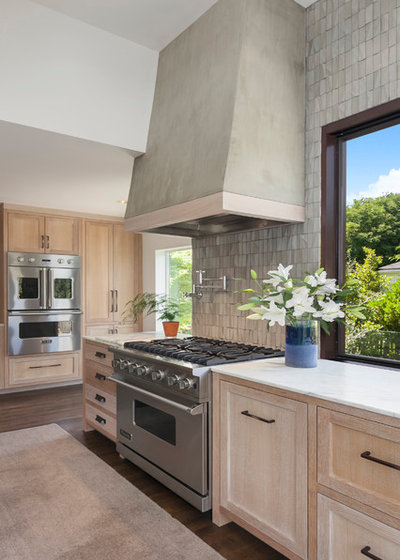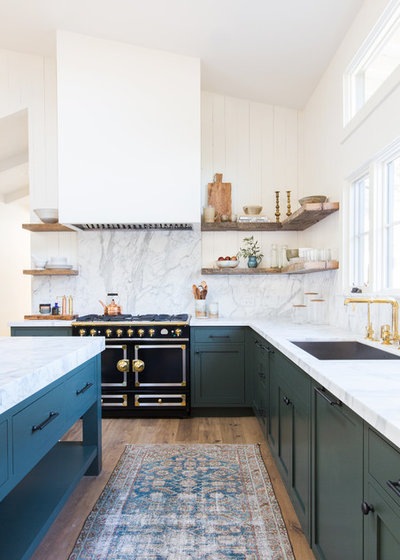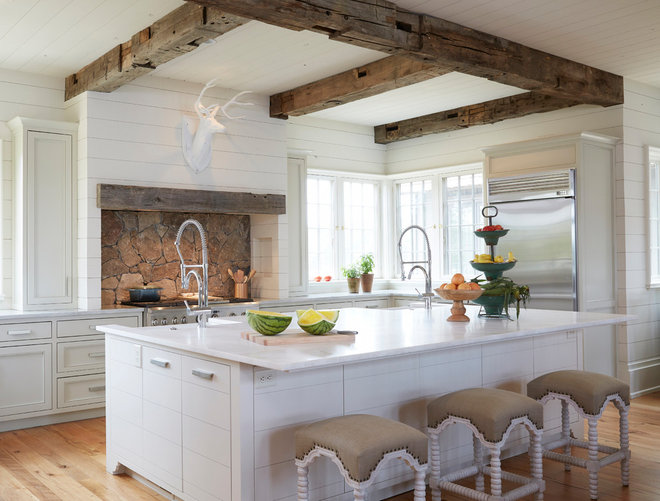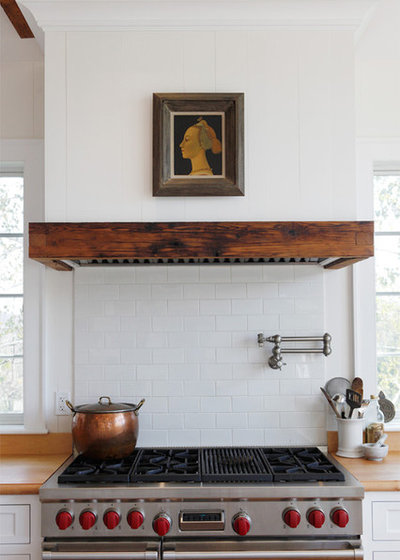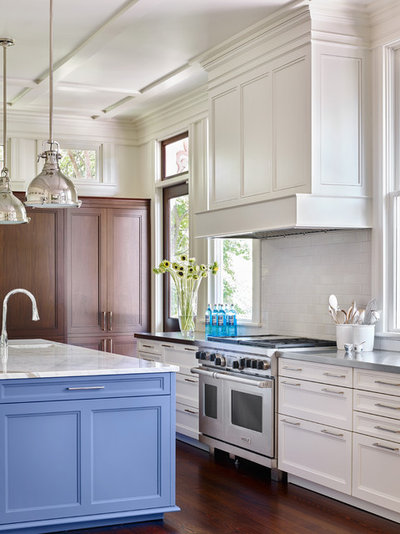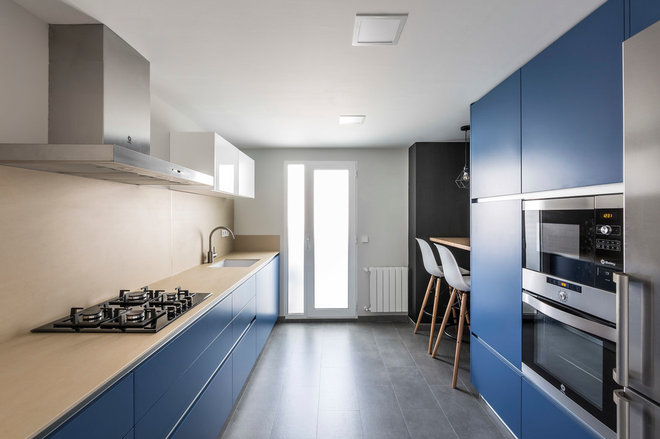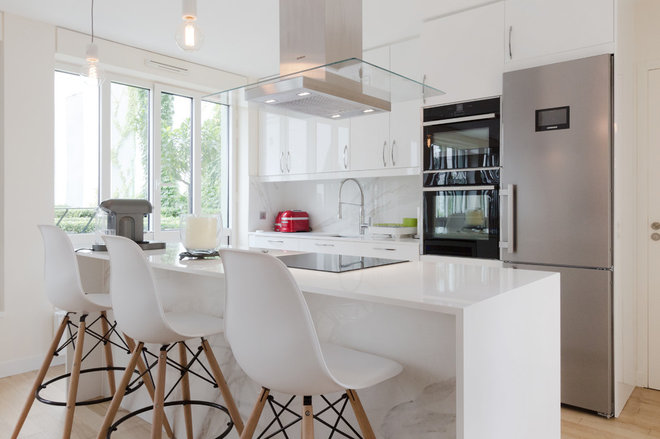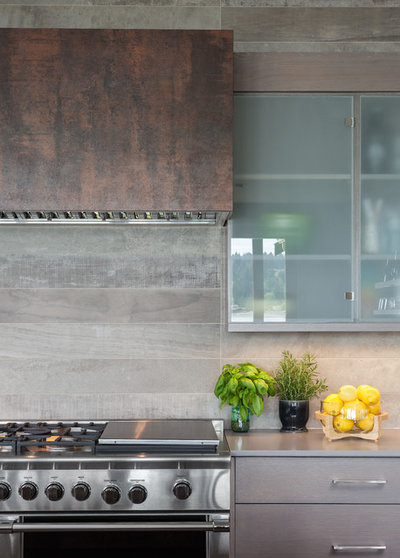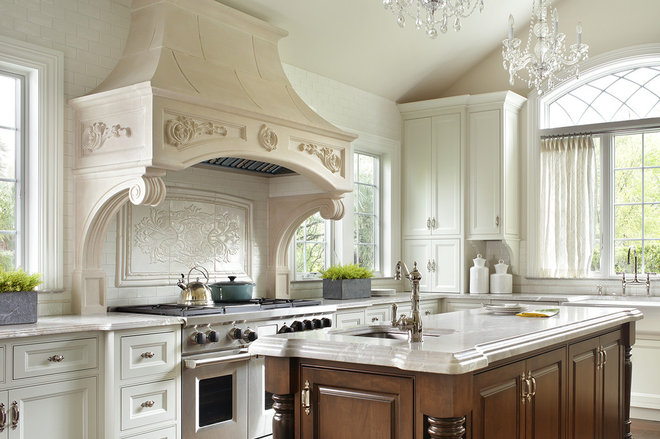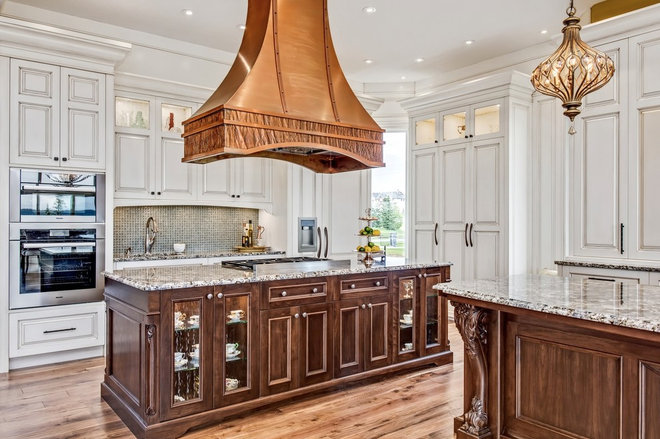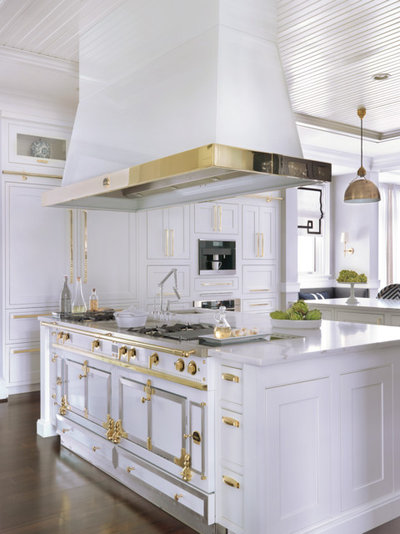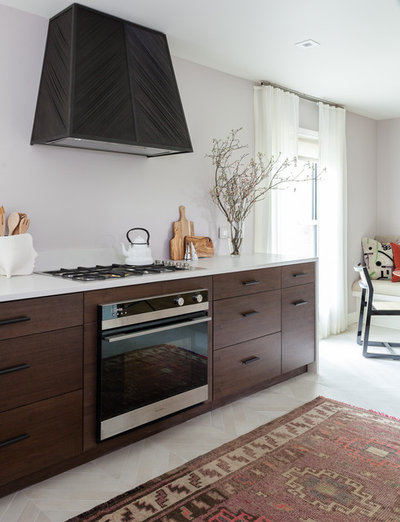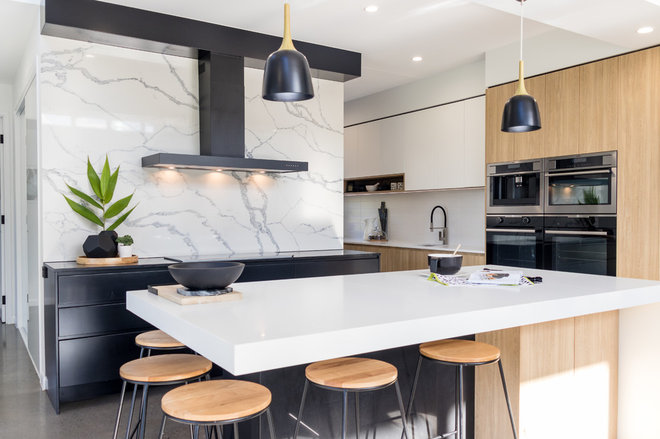How to Get Your Range Hood Right
First, it’s important to remember that a range hood is a kitchen appliance, with an important job to do. Read on for a summary of what you need to know about power, noise and sizing before you pick a model. And then we’ll look at some fun range hood options to fit a variety of decor styles.
Why do you need a range hood? In short, so that your home doesn’t become permeated by odors and grease from cooking. “That stuff doesn’t just disappear,” says kitchen designer Cindy Aplanalp-Yates of Chairma Design Group, in Houston. “Over time it will be in your fabrics, walls, wallcoverings, art and upholstery.” Although there are definite reasons to have a hood, some local building codes don’t require them, allowing this appliance to be an option rather than a requirement. Check with your local building department to find out what rules apply in your area.
Tip: The best time to choose your range hood is before you start your remodel or new build. Many models will work with standard 6-inch ductwork, but some more powerful models require up to 12-inch ducts. So it’s important to know what you’re getting before your HVAC goes in.
Read more about where your range hood should go
Range hoods come in a variety of shapes and sizes, as well as in an array of power levels. Blower fans are measured in terms of the cubic feet per minute (cfm) of air that the fan moves. (This information will be included in the model’s specifications.) Meanwhile, cooktops are measured in terms of how many British thermal units (Btu) of energy they produce.
There are basic rules of thumb to pair the cooktop’s energy production with the hood’s oil- and grease-sucking power. “For every 100 Btu, you need 1 cfm,” says Bradley Faber, showroom manager at Ferguson Bath, Kitchen & Lighting Gallery, in Bellevue, Washington. For example, a professional-grade range with 90,000 Btu would require a range hood that has 900 cfm.
These rules are good general guidelines, but your cooktop manufacturer’s specifications will tell you exactly how many cfm your range hood should be able to move. Kitchen designers advise that you should follow those specs precisely.
Tip: If your cooktop includes an indoor grilling component, Kristin Elder, senior director of appliances for Ferguson, recommends choosing a hood with more power than the cooktop manufacturer specifies. That’s because the recommended cfm will reflect the cooktop burners, not the indoor grill. “Indoor grills, like outdoor grills, produce a lot of smoke, grease and char, so it is a good idea to have a ventilation system with a lot of cfm,” Elder says.
Find range hoods and vents
Size matters for range hoods. “A lot of the more professional-grade ranges will tell you that your blower needs to be larger than your cooktop,” says Stephanie Frees of Plain and Posh, in Clarendon Hills, Illinois. “If you have a 30-inch cooktop, you might need a 36-inch blower. If you have a 36-inch cooktop, you might need a 42-inch blower.”
However, for a standard range, you may not need to oversize. Again, check the manufacturer’s specifications. These will also tell you the ideal distance that you should mount your hood above your cooktop, often between 24 and 34 inches. You’ll want to follow these specifications to get the best performance from your hood.
Note that this story is focused on range hoods that go above the cooktop. To read about range hoods you don’t see, check out this story about the disappearing range hood trend.
Tip: Also keep in mind that your ductwork can affect the power capacity of your hood’s blower. A straight, vertical run is ideal, as longer runs or those with bends decrease the blower’s efficiency.
“Hoods are like dishwashers: Some are quiet, and others are noisy,” says kitchen designer and Houzz contributor Barbra Bright of Barbra Bright Design, in San Francisco. “Know what you are purchasing!” Those are wise words, because you aren’t likely to use something you can’t tolerate.
Range hood noise levels are measured in sones, a unit of loudness as perceived by a person with normal hearing. Higher-powered hoods tend to have higher sone ratings, though some powerful hoods do have lower sone ratings. This isn’t something you want to be theoretical about; you’ll want test out the noise level at the appliance showroom.
One way to reduce the noise of a powerful blower is by mounting the blower (or fan) itself outside your home, either on the roof or the side, so that it’s not right inside the hood shell. “Typically you’re looking at a 40 percent reduction in noise,” Faber says of this option. This does make installation more complex and costly, so again, you’ll want to plan ahead.
Tip: If you don’t want to have any odors, you should turn your hood before you start cooking, says Jennifer Gilmer of Jennifer Gilmer Kitchen & Bath, in Chevy Chase, Maryland.
Read more technical details about hoods
One piece or two? There are two main types of range hoods: all-in-one and insert plus shell. Most of the models on the market are the all-in-one kind, composed of the exterior portion of the hood that you see from the kitchen and the blower fan inside. These are great options, particularly when you want a more subtle or timeless range hood look — perhaps a classic stainless steel one, for instance.
Range hood: Classico Poco series with an IQ Blower, Best; find bar and counter stools
If you take this route, you might get something like the range hood in this photo: an eye-catching statement piece with the blowing power that you choose. It’s also a great example of one of Bright’s kitchen secrets: “Let it be the focal point on the wall,” she says.
Tip: Keep in mind that if you purchase a hood shell and a blower separately, the sone rating for the blower won’t typically be specified. Manufacturers specify sones for a model only when the blower and hood come together.
Read more about different hood styles | Browse chandeliers
Here’s an example of the two-part option working well — only in this case, using just one of the two parts. The clients for this Atlanta kitchen originally wanted a metal range hood, but their budget didn’t allow for a metal hood. So designer Lauren Davenport Imber of Davenport Designs had a wood range hood custom-made and faux-painted to look like metal. The two vertical lines on the hood are stainless steel straps that have been riveted to the frame. Inside the hood is the insert, or blower, that gives this range hood its sucking power.
Read more about this kitchen
Read more about this kitchen
For example, Frees is working with a client who wants to showcase a piece of art in her kitchen, so the plan is to create a wooden box to surround the insert, which will serve as a beautiful backdrop for the art. Frees recently framed out a hood for another client and had it covered in subway tile, just like the rest of the kitchen.
Range Hood Styles for Transitional Kitchens
The hood in the kitchen pictured here (blue base cabinets, open shelving, vintage rug) perfectly aligns with the angle of the wall — and something like this could be created using the technique of hood insert and framed-out surround. This is a good example of a transitional kitchen. (Transitional is a style that blends modern and traditional elements for a current look.) A range of styles will work in a transitional kitchen.
For a contemporary kitchen, you’ll probably want to consider a range hood that has clean lines — meaning a minimum of embellishment. The stainless steel hood in this blue kitchen is a good example of a clean-lined style. This type of hood is called chimney-style.
Read more about different hood types | Find microwaves
Hood: custom in Iron Copper, Neolith; perimeter counter: Lapitec
In a traditional kitchen, a mantel-style range hood works well, as does a decorative wood hood, Gilmer says. “In traditional, a lot of people like to have hoods made out of wood and painted whatever color the kitchen is,” she says.
Other considerations:
- Cleaning and care. Stainless steel is probably the simplest type of range hood to clean compared with wood, tile or other finishes. Most stainless hoods can be cleaned with a product designed specifically for that metal, whereas other metals like copper and hammered nickel typically come with a protective coating and may tarnish if the metal is exposed. Frees, the Illinois designer, recommends cleaning these metals with a very diluted solution of mild soap and water.
- “Makeup air.” If your range hood is higher-powered, you’ll want to check with your local building department regarding regulations for what is known as “makeup air.” Depending on your hood’s cfm level, some jurisdictions may require you to install an air circulation system that brings fresh air back into the home.
More
Homeowner’s Workbook: How to Remodel Your Kitchen
Details That Count: Tips for Range Hoods, Appliances and Lighting
